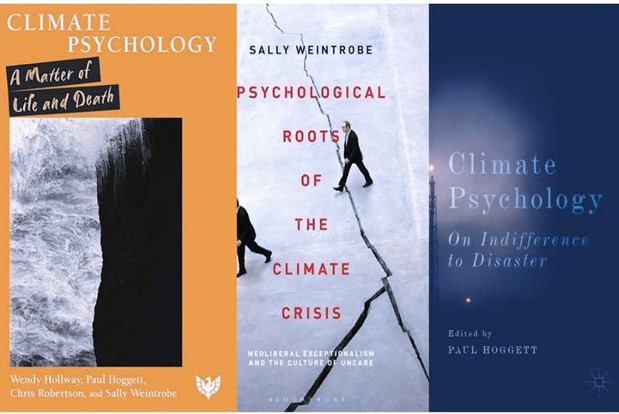CPA members have written, edited and contributed to a wide range of international publications and studies, building a transdisciplinary understanding of what climate psychology can contribute in the ecological and climate crisis. This includes psychosocial, psychoanalytic and psychotherapeutic research, exploring climate distress, trauma, resilience, art therapy, ecopsychology and nature connection, and climate justice.
Recently published books
Climate, Psychology and Change: Reimagining Psychotherapy in an Era of Global Disruption and Climate Anxiety
Author: Steffi Bednarek 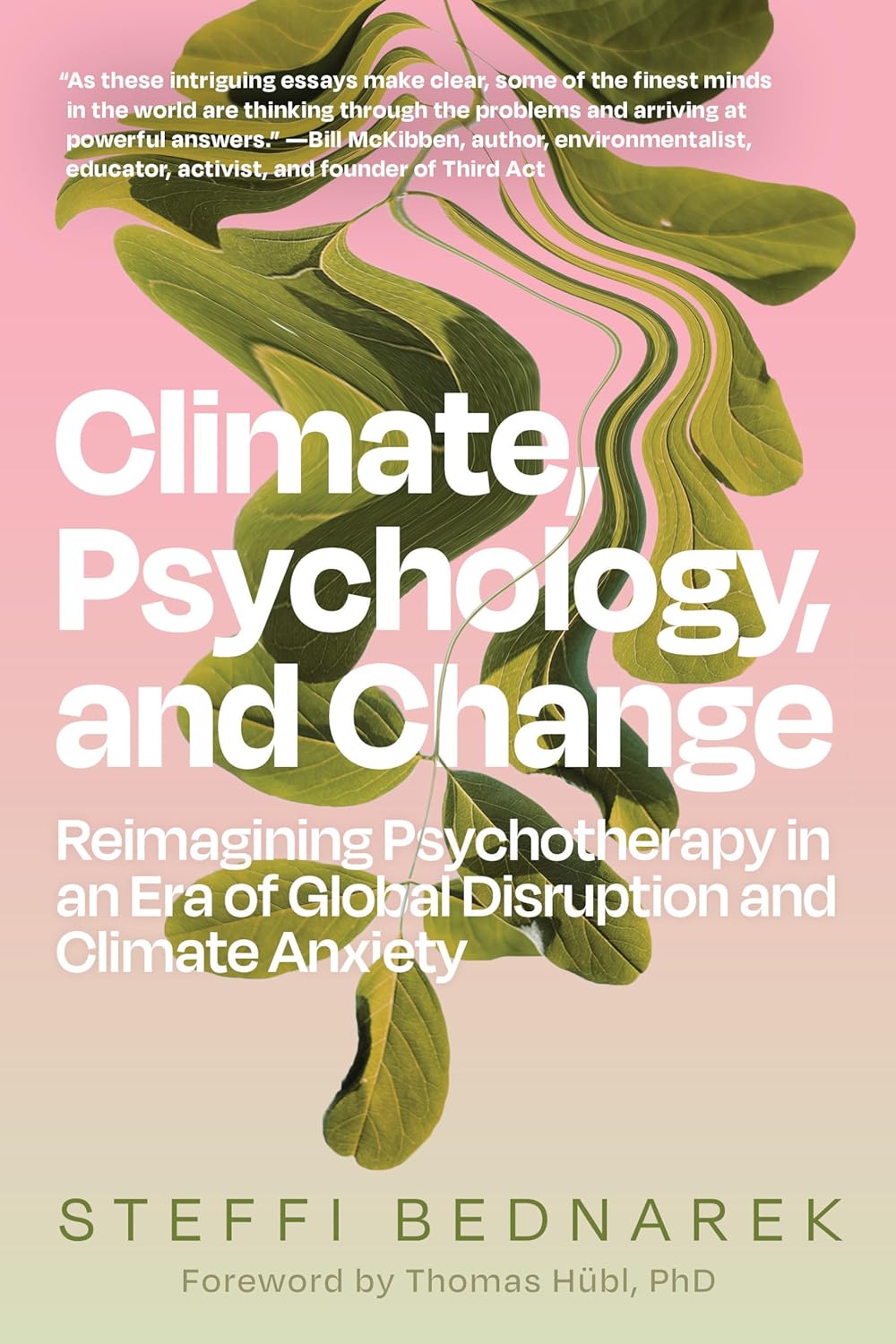
Western psychotherapy views our practice as a way to bring clients back to baseline "normal." But our society's "normal" is profoundly unwell: our ways of being reflect the same unsustainable systems that erode our ecosystems, accelerate global destruction, and ultimately extract our humanity. Moving toward healing and purpose in uncertain times means evolving the way we do therapy and the way we think about mental health.
Editor and climate psychologist Steffi Bednarek invites us to co-create a field that navigates unknown futures with skill and grace--one that helps clients build resilience and holds space for the uncertainties unfolding before us.
Holistic and intersectional, this collection reckons with the ways power, colonialism, and capitalism impact our myriad crises--while shaping Western psychology as we know it.
With essays by clinicians from both the Global South and Global North, Climate, Psychology, and Change is an anthology unlike anything you've read before: a necessary response, an urgent appeal, and a fearless look forward at how we care for our clients, eyes wide open, with compassion and skill in an uncertain world.
More information abut the book can be found via this link (climatepsychologyandchange.com).
Holding The Hope: Reviving Psychological and Spiritual Agency in The Face Of Climate Change 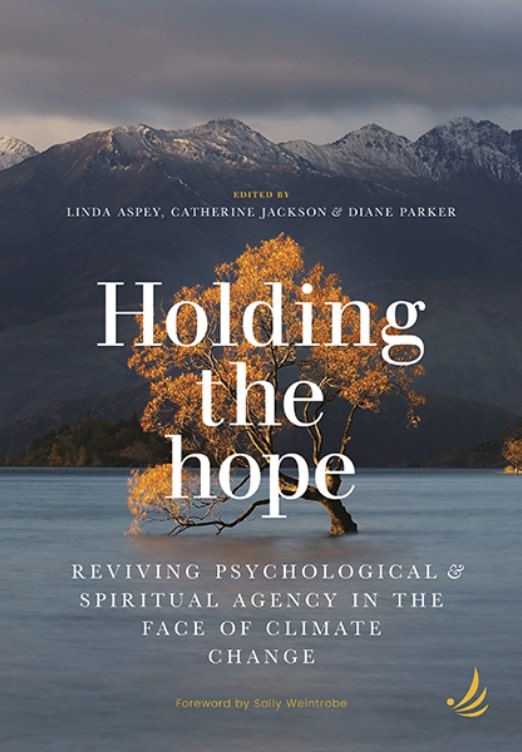
Editors: Linda Aspey, Catherine Jackson, and Diane Parker
Catastrophic climate change and the growing reality of the destruction of Earth’s ecosystem and species extinction hang over us all. These topics are increasingly coming up in the work of all talking therapy professionals – counsellors, psychotherapists, coaches and psychologists. They must be able to hold their clients’ and communities’ emotions and responses – fear, anger, denial, grief, helplessness and hopelessness – and manage their own.
The chapters in this thought-provoking, honest, moving and sobering book explore the frameworks, theoretical constructs and ways of working talking therapists have devised to hold hope and build agency in the face of this immensity of complexity, uncertainty and injustice. Contributors – including several members of the Climate Psychology Alliance - from a range of cultural backgrounds and professional disciplines discuss our inter-relationships with the natural world, indigenous practices and understandings, how to face the reality with our children and young people, how to go on practising at the edge of despair, and much more.
Available via PCCS Books (pccs-books.co.uk).
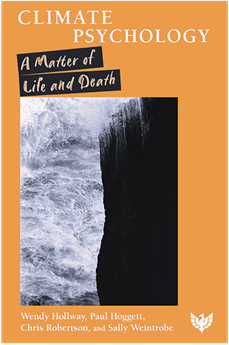 Climate Psychology: a Matter of Life and Death
Climate Psychology: a Matter of Life and Death
Authors: Wendy Hollway, Paul Hoggett, Chris Robertson and Sally Weintrobe
While the last decade required a focus on climate denial in all its manifestations (which continues in new ways), a turning point has now been reached. Increasingly extreme weather across the world is making it impossible for simple avoidance of the climate threat. Wendy Hollway, Paul Hoggett, Chris Robertson, and Sally Weintrobe address how climate psychology illuminates and engages the life and death challenges that face terrestrial life.
Available through the Phoenix Publishing House.
Psychological Roots of the Climate Crisis: Neoliberal Exceptionalism and the Culture of Uncare
Author: Sally Weintrobe
Psychological Roots of the Climate Crisis tells the story of a fundamental fight between a caring and an uncaring imagination. It helps us to recognise the uncaring imagination in politics, in culture – for example in the writings of Ayn Rand – and also in ourselves. Sally Weintrobe argues that achieving the shift to greater care requires us to stop colluding with Exceptionalism, the rigid psychological mindset largely responsible for the climate crisis. Available here.
The Work of Whiteness
Author: Helen Morgan
‘Whiteness’ is a politically constructed category which needs to be understood and dismantled because the system of racism so embedded within our society harms us all. It has profound implications for human psychology, an understanding of which is essential for supporting the movement for change. This book explores these implications from a psychoanalytic and Jungian analytic perspective. Available here.
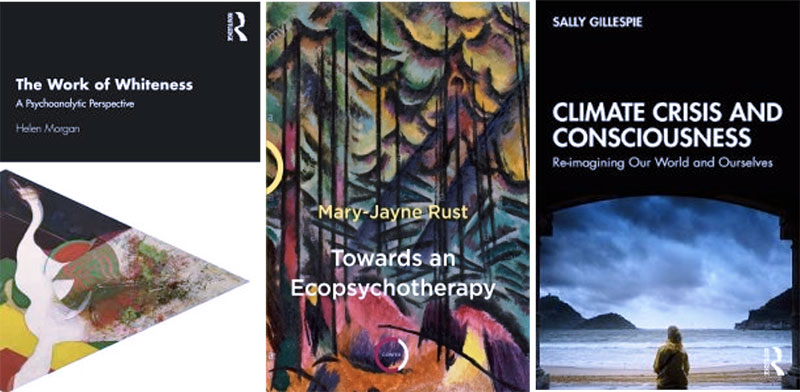
Towards an Ecopsychotherapy
Author: Mary-Jayne Rust
Towards an ecopsychotherapy offers diverse stories, from the therapy room to therapy in the forest, about the healing process of reconnection with the more-than-human world as well as with our wild animal selves. It provides an insight into ecopsychotherapy in practice by outlining its history, key themes, ideas, and controversies. Available here.
Climate Crisis and Consciousness: re-imagining our world and ourselves
Author: Sally Gillespie
With its unique focus on the psychological experience of facing into the climate crisis, this warm and supportive book offers companionship and sustenance for anyone who wants to be alive to our natural world and to the existential challenges of today. It is an essential resource for counsellors, psychotherapists, social workers and other helping professionals, as well as climate campaigners, policy makers, educators, scientists and researchers. Available here.
Anthropocene Psychology: Being Human in a More-than-Human World
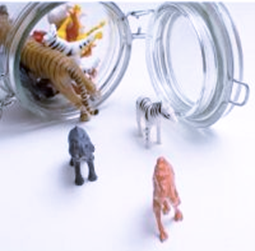 Author: Matthew Adams
Author: Matthew Adams
This ground-breaking book critically extends the psychological project, seeking to investigate the relations between human and more-than-human worlds against the backdrop of the Anthropocene by emphasising the significance of encounter, interaction and relationships. Available here.
Climate Psychology: On Indifference to Disaster
Edited by Paul Hoggett
This book investigates the psycho-social phenomenon which is society’s failure to respond to climate change. It analyses the non-rational dimensions of our collective paralysis in the face of worsening climate change and environmental destruction, exploring the emotional, ethical, social, organizational and cultural dynamics to blame for this global lack of action. The book features eleven research projects from four different countries and is divided in two parts, the first highlighting novel methodologies, the second presenting new findings. Available here.
Selected recent articles
There are a wide range of articles published by CPA Members. These can be browsed and searched by keyword using our literature repository below. These three recent publications are a taste of the kind of work our members do.
The Emotional Experience of Members of Scotland's Citizens' Assembly on Climate Change (2022)
 Author: Nadine Andrews
Author: Nadine Andrews
In facing up to the reality of the climate crisis and the risks it poses, people encounter powerful emotions that can be difficult to bear. Consequently, various defences and coping strategies may be used to suppress or avoid feeling these emotions. The way in which emotions are regulated has important implications for wellbeing and decision-making. This paper investigates the emotional experience of members of Scotland's Climate Assembly to explore which, if any, emotions are experienced and how they are regulated. Available here.
Climate anxiety in children and young people and their beliefs about government responses to climate change: a global survey
Authors: Elizabeth Marks, Caroline Hickman, Panu Pihkala, Susan Clayton Eric R. Lewandowski, Elouise E. Mayall, Britt Wray, Catriona Mellor, and Lise van Susteren.
Funded by Avaaz, this study surveys 10,000 young people (aged 16-25 years) in ten countries on their thoughts and feelings about climate change, and government response. It is freely available via The Lancet Planetary Health.
Climate Change, Fragmentation and Collective Trauma. Bridging the Divided Stories We Live By (2021)
 Author: Steffi Bednarek
Author: Steffi Bednarek
This paper explores psychological responses to climate change with the lenses of brain hemisphere imbalance, the fragmentation process of collective trauma and the Jungian maturation theory of two halves of life, which views suffering as a necessary component in the move towards a ripened culture. The perspective of climate trauma is widened to an inter-generational aspect. The article argues that the disowned and marginalised aspects of society need to be re-integrated, bridging cultural compartmentalisation and balancing the unequal representation of left and right hemisphere attributes. See the Future Foundation version of this paper which includes animation and artwork.
Originally published as part of the Journal of Social Work Practice Special Edition - Ecology, Psychoanalysis and Global Warming: Present and Future Traumas
The Climate Psychology Literature repository
 The Climate Psychology Literature repository brings together a wide range of sources of literature and information about aspects of climate psychology, and is constantly evolving. It includes links, abstracts and brief descriptions of academic and magazine articles, book chapters, links to talks and podcasts, and a growing number of Masters and Doctoral theses.
The Climate Psychology Literature repository brings together a wide range of sources of literature and information about aspects of climate psychology, and is constantly evolving. It includes links, abstracts and brief descriptions of academic and magazine articles, book chapters, links to talks and podcasts, and a growing number of Masters and Doctoral theses.
The repository is hosted by Zotero and can be accessed here.
Please note that some publications are behind a paywall. We are working towards providing access to free, pre-publication versions of papers by CPA members and adding these as an attachment where possible.
There are also valuable resource lists that we do not wish to duplicate. Here are the links to existing lists and libraries, together with a brief description:
- ITRC Library: a list of thematically organised resources on building personal and psycho-social-spiritual resilience for climate change from ITRC (International Transformational Resilience Coalition)
- Climate Psychiatry Alliance Library: a library of resources of articles, podcasts and other materials that address the range of climate change and impacts on mental health.
We welcome more contributions. If you’d like to suggest something for the repository please submit details via this Google form after checking the criteria for inclusion below.
Criteria for Inclusion in CPA online Literature Repository on Zotero
To keep material selected for the repository relevant to Climate Psychology, as defined in the CPA Handbook it may be helpful to consider the following when assessing suitability:
1. Literature that deepens an understanding of feelings and/or behaviours as related to the climate crisis at all levels - from the individual to interpersonal, societal and political. This includes:
- exploring the emotions, affects and feelings that might come up when facing the climate crisis, e.g. grief, anxiety, despair, guilt, anger, shame
- exploring the defences that might be used to avoid the difficult feelings, and/or the unconscious processes at play, e.g. dissociation, disavowal, ambivalence, denial.
- exploring the conflicts, dilemmas and paradoxes that individuals, groups and societies face in negotiating change.
- exploring cultural assumptions and practices that act as barriers to us taking action on the climate crisis, e.g. materialism, consumerism, our relationship with, and view of, the other-than-human world.
2. Literature that has practical application for dealing with those feelings and/or behaviours as related to the climate crisis at all levels - from the individual to interpersonal, societal and political. This includes:
- exploring psychological resources, such as resilience, (radical) hope, courage or imagination, or eco-psychological resources that examine our interaction with the other-than-human world.
- discussing effective climate communication and/or creative approaches to encouraging public engagement with the climate crisis
- offering resources that might support activists, scientists, those working in psychotherapy or policy makers.


